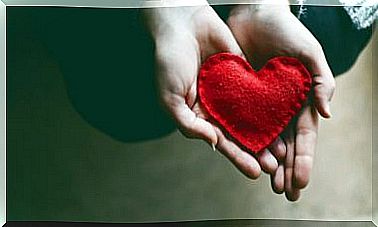What Happens When We Need An Apology, But We Will Never Receive It

Many of us advance through life’s journey with a thorn stuck inside. It is the one that continues to hurt despite the time spent after a lie, a betrayal or the worst of disappointments. Sometimes we need an apology for these experienced facts, but at the same time we are very aware that we will never receive it.
What to do with that feeling? How to manage that anger combined with large doses of sadness? The truth is that few sensations are so complicated to handle, to assume and even to understand. It is like a creaking door that we cannot close all the way. It remains open and a cold stream continues to enter through it, interspersed with memories that we cannot erase.
Whether we want it or not, there are many people who do not know or want to ask for forgiveness. They are figures allergic to the art of emotional repair and oblivious to the principle of responsibility and ethics. It is always easier to walk away and say nothing, because, after all, saying out loud a “forgive me for what I have done” does not bring them anything or offer them any benefit.
Let’s understand what to do in these circumstances.

When we need an apology, but are never going to receive it: what can we do?
Saying sorry implies, above all else, acknowledging that one has done something wrong. In addition to recognition, what is sought is also to express regret to the other. Likewise, when asking for forgiveness, it is admitted that said concrete act has had an obvious consequence: generating pain and suffering.
As we can see, few processes are so complex and demand such a deep exercise of empathy, emotional delicacy and courage to admit what happened. Not everyone knows or wants to apply each of these very basic processes. An example, sometimes, we meet people who ask us for forgiveness as someone who says good morning.
Expressing apologies does not solve anything if the other does not understand that our statement is sincere. Something like that hurts, it’s true. However, it stings even more when we need a specific apology, but we know that we will not receive it. Either because that particular person has distanced themselves or because they simply have no interest in doing so.
What can we do in similar situations?
Understand to accept: there are people who are unable to say sorry
Sometimes, to handle a reality that hurts, it is necessary to understand it. Therefore, it is always interesting to delve into the personality of the person allergic to apologies, of the escapist in the exercise of the demand for forgiveness:
- To apologize is to admit one’s fallibility. Indeed, this is the first cause. Some will never take the step to apologize because they hold your dignity and image of self-efficacy in high regard to admit “that they have done something wrong.”
- Lack of selfesteem. Men and women with low self-esteem also cannot allow themselves to accept that they have done something wrong. Something like that further destroys his battered internal image.
- Asking for forgiveness is a humiliation. In certain cases, the person who commits an injury instead of asking us for forgiveness, what he does is blame us for it. They are very twisted cases, it is true, but they have a specific origin. Faced with evidence of having done something wrong, they activate their defense mechanisms and cognitive distortions.
“As I cannot admit that I have done something wrong, the best thing is to project responsibility on the other.” This strategy is very common in narcissists.
If possible, explain why you deserve and need to be forgiven
When we need an apology, we have our right to demand it. Sometimes something like this may not be possible because the figure who committed the offense is gone. However, in case we have that person close, we must ask for it:
- Don’t wait days, weeks, or months for them to ask for forgiveness. Any situation that has constituted an attack on your confidence or dignity deserves to be put on the table in an assertive and respectful way.
- Also, the main objective will be for the other person to see that their behavior has not been correct. To do this, we will explain in detail the negative behavior and the consequences experienced:
- “I shared a confidence with you and you have shared it with other people. I feel betrayed by it ”.
- “I was counting on you for this project because you had told me so, but now you leave without saying anything to me. I am disappointed by your lack of commitment and sincerity ”.
Sometimes, the simple fact of exposing the reality of what happened and what we felt about it already relieves us. Regardless of whether a “sorry” occurs.

We all need an apology, but sometimes not even a pardon fixes the grievance
This fact is curious and worth reflecting on. Research papers, such as those carried out at the University of Rotterdam in the Netherlands, support the hypothesis that when we are betrayed, deceived or disappointed, we need an apology. However, in certain cases that apology does not bring us relief.
Let’s take an example. Our best friend and our partner have an idyll. When we find out, we both apologize. Despite this, the damage has already been done and a “sorry” does not always act as a balm for suffering. The same can happen when someone very dear to us does not support us in a difficult situation. They can ask us for forgiveness, but the fact as such has already happened.
Therefore, when we desperately need an apology for an injury suffered, it is worth some preliminary reflection. Sometimes a loud “forgive me” is insincere. Other times, that apology doesn’t give us the relief we hoped for.
In those (and in all circumstances), the work of recovery falls on ourselves. We will do so by accepting reality and repairing the damage with high self-esteem.
The world is inhabited by courageous and empathetic people who will always be there for us. However, we must also assume that fallible figures abound, those who will never ask you for forgiveness for the damages they have committed.









